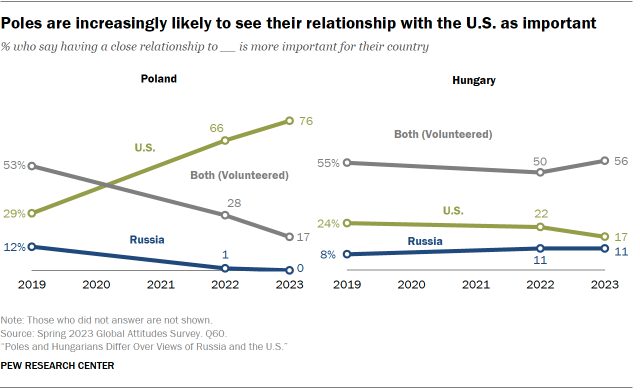When asked whether having a close relationship with the U.S. or Russia is more important for their country, Hungarians and Poles hold diverging opinions. Roughly three-quarters of Poles – who have the most favorable views of the U.S. of any country in our 2023 Global Attitudes survey – see their country’s relationship with the U.S. as more important than its relationship with Russia. Meanwhile, a majority of Hungarians volunteer that close relationships with the U.S. and Russia are equally important.

In 2019 – prior to Russia’s invasion of Ukraine – Hungarians and Poles held relatively similar views of their countries’ relationships with the U.S. and Russia. Just over half in each nation said close relationships with both countries were important. Roughly a quarter said relations with the U.S. were more important and about one-in-ten favored close relations with Russia.
While views in Hungary have changed relatively little in the last four years, opinion in Poland has shifted significantly. The share prioritizing a close relationship with Russia, or a relationship with both the U.S. and Russia, decreased significantly between 2019 and 2022. That downward trend continues in 2023. A large majority of Poles (76%) now say a close relationship with the U.S. is more important for their country – a 47-point increase from 2019 and a 10-point jump in the last year.

These ratings are tied to more general opinions of international engagement. In both Hungary and Poland, adults who say it is best for their country to take an active role in world affairs are 9 points more likely to prioritize close relations with the U.S. than those who say their country should be concentrating on problems at home. In Poland, for example, 83% who say their country should be active in world affairs also say a close relationship with the U.S. is more important, compared with 74% of Poles who think they should concentrate on problems in Poland.
A similar pattern exists between those who say their country should consider the interests of other countries, even if it means making compromises, and those who favor their country following its own interests, even when other countries strongly disagree. In Hungary, nearly three-in-ten (28%) who say other countries’ interests should be considered favor a closer relationship with the U.S., compared with 8% among those who want Hungary to follow its own interests.




